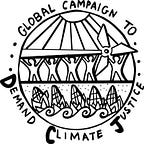The World at 1°C — Climate Change Shockwaves (June ‘17)
Part 1 of our essential climate justice summary of the past month
June gave the world a taste of things to come as climate change-fuelled killer heatwaves and chaos continued to envelope many countries, with fires and floods devastating the lives and livelihoods of many people across the world.
In Portugal, unprecedented wildfires killed 62 people as they attempted to flee to safety. A deadly convergence of factors led to the tragedy. Temperatures hit a freakish 40°C and as firefighters rushed to tackle over 50 fires they did not have the capacity to deal with all the fires. Strong winds let the fires spread quickly through large eucalyptus plantations, which have also altered the water tables meaning that many towns did not have water to fight the fires. Many of those that did lost electricity and were unable to pump water from the wells.
Worryingly, wildfires and climate change are actually locked in a vicious cycle: as temperatures increase and wildfires become more prevalent and more intense, more trees are lost, meaning forests edge closer to become sources of carbon rather than sinks. After an intense fire, forests are less able to reseed themselves, meaning there are fewer trees to store carbon.
Large swathes of India have been scorched in an extreme heat wave, with temperatures soaring to 48°C in and Punjab and Uttar Pradesh, where 10 people died. Temperatures in several other states were not far off, with Bihar experiencing 46.1°C and Odisha 44.7°C, leaving 16 dead.
June temperatures also hit mind-boggling levels in Iraq and Iran, with the Iraqi government calling a 4 day holiday as Baghdad reached 52°C while apparent temperatures in Iran were in the 70s. Celsius.
A record breaking summer heatwave is also sweeping the U.S. with temperatures in Phoenix high enough that dozens of flights had to be cancelled. The hot, dry conditions that climate change is creating in the Southwest (“Dust-Bowlification”) are perfect for the rapid spread of diseases such as Valley Fever, which has increased 800% from 2011.
If this month you did not experience a killer heatwave, you more than likely soon will, as by 2100 up to 75% of humanity will experience dangerous summer temperatures. While some people will be able to escape the heat, many will not. The class and race fault-lines of the climate crisis will become ever starker: for example, India is warming faster than other parts of the world but 25% of its population do not have access to electricity and so are more vulnerable to soaring temperatures. Agriculture in the developing world already bears 25% of all damages arising from disasters.
While in the grip of a heatwave or drought, such as South Korea’s current “worst drought in 30 years,” rain would be seen as a welcome relief, in fact storm deluges after prolonged drought do nothing to restore water reserves and merely cause more havoc. This is exactly what happened in South Africa this month as a combination of wildfires and the worst storm in living memory killed 9 people and displaced 10,000.
Even when they don’t strike during a drought, the superstorms of the Anthropocene are still deadly. This month Tropical Storms Beatriz triggered landslides that left at least 5 citizens and 6 soldiers dead in Mexico while mudslides in Guatemala also killed 11 people. Across the world in Bangladesh, Cyclone Mora damaged thousands of homes and displaced hundreds of thousands. 134 people died in landslides across the country; the death toll continues to rise. As with other “natural disasters” such as wildfire, the frequency and severity of landslides will increase with climate change.
Heavy rains also savaged China, killing 6, and parts of India, where entire houses were submerged in their hundreds and 8 people lost their lives. At least 4000 have been displaced. Their numbers add to the already-record breaking 65.6 million people who are currently displaced — around a third outside of their country.
As well as people, many animals are fleeing the impacts of a warming world. This month marine experts warned of a climate emergency as fish flee tropical waters for in an aquatic exodus to more temperate conditions. They are followed closely by deadly warm water pathogens such as Vibrio vulnificus, some of which can now be found within the Arctic circle. It’s not only water-borne diseases we must worry about: the ticks that carry Lyme disease are now present as far north as Sweden and are increasingly able to survive winter. Microbiologist Stanley Maloy puts it best:
“So often so many of the things we talk about with climate change are ‘this is going to be a problem in 2030 or 2050 or 2100,’ and it sounds so far away. But we’re talking about things where our one-degree centigrade change in temperature is already enough to affect infections.”
The impacts of our past mistakes are already upon us. Though we do not need a science degree to see those impacts, it’s instructive that the latest studies show us that we have a mere 3 years before we guarantee warming the likes of which we cannot endure. CO2 levels are already at an all-time monthly high, which is a worrying sign for a number of reasons. While some hold on to a belief in technology and markets, i.e. neoliberal fundamentalism, the fact is that without international regulation and cooperation we are quite literally cooked. For example, the “logic” (read: ideologically-based decisions) of the market would see a glut of gas infrastructure go into place around the world, yet a new study shows gas has no place in meeting the 1.5 °C Paris temperature goal.
Further questions of movement strategy, as well as the latest climate change geopolitics, will be taken up in upcoming posts. Stay tuned.
